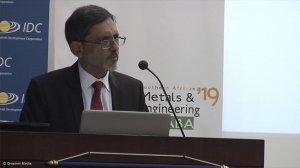To grow South Africa’s economy and expand its productive sectors, master plans will need to be developed for each of those sectors, Trade and Industry Minister Ebrahim Patel said on Friday.
Speaking on the second day of the Metals and Engineering Indaba, in Sandton, on Friday, the Minister stressed that refocusing the South African industrial strategy as a central pillar of the country’s economic recovery, would be key to growing the economy.
Against this backdrop, Patel acknowledged that “government recognises a need to do things differently”, adding that he would soon appoint a facilitator to engage with stakeholders about what they think would assist industry and what they would be willing to do to achieve that growth.
Government has, to date, received 40 submissions from individual businesses, associations and unions, which it intends to use in developing a master plan for the industrial, steel and manufacturing sectors.
A working draft would be finalised “as soon as possible”, Patel told delegates.
This master plan, he explained, must be action-oriented, implementable and set out “a crisp set of action plans” so that all stakeholders knew what was expected of them and government.
He further outlined a number of ideas that would have a material impact on the metals and engineering sectors.
First, the Minister identified the need to improve industrial performance and to enhance the competitiveness of industrial companies in the sector. Government's role in this process, he explained, would be facilitative, focus on creating an enabling environment and ensure that “all tools in the public toolbox” were available to help industry build a competitive, dynamic and agile sector.
Through the master plan, government would reaffirm its commitment to the sector, Patel noted.
Secondly, the Industrial Development Corporation has revised its criteria for the R1.5-billion downstream steel competitiveness fund, which Patel said would “provide greater access and better interest rates” for businesses in the sector.
Another initiative is the Department of Trade, Industry and Competition's establishment of a Metals Fabrication Programme, which will pave the way for up to R30-million to be invested in the establishment of new foundries and mills.
Further, Patel pointed out that a new automotive master plan, scheduled to run to 2035, would increase local content from 39% currently, to 60%. This, he explained, would provide substantial opportunities for the metals value chain, particularly that of steel, which constituted more than half the weight of the average vehicle.
“It will be important for the metal and engineering industry to engage with their automotive industry counterparts to look for ways to increase localisation and local value-add,” the Minister said.
Another pillar of the industrial strategy is to develop clusters in special economic zones (SEZs), which are intended to revitalise industrial sites and businesses in digital hubs.
Government is considering the establish an SEZ in Gauteng that will focus on supplying components for the automotive industry.
Further clarification on this is expected by November.
EMAIL THIS ARTICLE SAVE THIS ARTICLE ARTICLE ENQUIRY
To subscribe email subscriptions@creamermedia.co.za or click here
To advertise email advertising@creamermedia.co.za or click here










